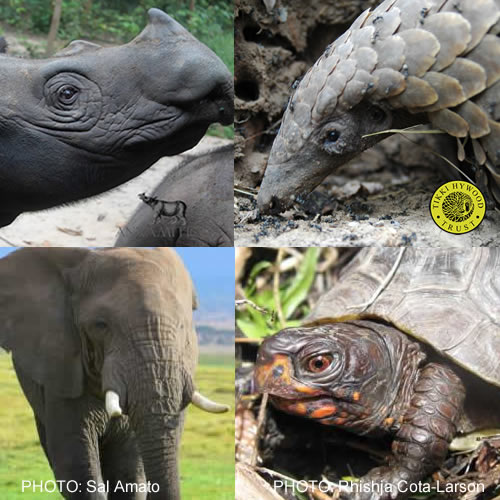
Today the United States has announced a ban on the commercial trade of elephant ivory, as part of its National Strategy for Combating Wildlife Trafficking.
The U.S. National Strategy action was unveiled on the first day of the International Wildlife Trafficking Symposium in London, where government officials from 50 countries are meeting to address the illegal wildlife trade crisis.
“This strategy sets forth a broad and time-sensitive course of action. This crisis must be addressed aggressively and quickly, or it will be too late.”
The National Strategy will advance three strategic priorities:
- Strengthening domestic and global enforcement;
- Reducing demand for illegally traded wildlife at home and abroad;
- Building international cooperation, commitment, and public-private partnerships.
President Barack Obama states in the Strategy that “Well-armed, well-equipped, and well-organized networks of criminals and corrupt officials exploit porous borders and weak institutions to profit from trading in poached wildlife.”
“This is a global challenge requiring global solutions.”
Regarding ivory, not only is the U.S. tightening antiques and sport hunting loopholes, a previous Fish and Wildlife Service special rule that had relaxed Endangered Species Act restrictions on African elephant ivory trade will be revoked.
- All commercial imports of African elephant ivory, including antiques, will be prohibited. Commercial exports will be prohibited, with very few exceptions. In the case of “exceptions” (bona fide antiques, certain noncommercial items, and in exceptional circumstances permitted under the Endangered Species Act), it is now the responsibility of the importer, exporter, or seller to demonstrate that an item meets these criteria. To qualify as an “antique”, an ivory item must be more than 100 years old and meet certain other Endangered Species Act requirements — and it is now the responsibility of the importer, exporter, or seller to demonstrate that an item meets these criteria.
- The domestic resale of elephant ivory will be significantly restricted. Sales across state lines will be prohibited (except for bona fide antiques). Sales within a state will be prohibited “unless the seller can demonstrate an item was lawfully imported prior to 1990 for African elephants and 1975 for Asian elephants, or under an exemption document.”
- Trophy hunting of African elephants will be limited to two per year, per individual.
“This ban is the best way to help ensure that U.S. markets do not contribute to the further decline of African elephants in the wild.”
The U.S. is steadily advancing the war on wildlife trafficking:
- November 15, 2013: the U.S. destroyed its six-ton stockpile of confiscated ivory, and has since been followed by mainland China and France, with Hong Kong pledging to rid itself of 30 tons (28 tonnes) of its 36-ton confiscated ivory stockpile.
- September 9, 2013: Secretary of the Interior Sally Jewell named members of a new federal advisory council on wildlife trafficking. Formed as a result of a President’s Executive Order issued in July, the council will advise the Secretary and members of the Presidential Task Force on wildlife trafficking.
- July 1, 2013: President Obama issued an Executive Order which includes a $10 million pledge to improve protection for threatened wildlife populations in key African countries, a Presidential Task Force on Wildlife Trafficking to develop a national strategy within six months to fight wildlife crime, and a review of the federal government’s Transnational Organized Crime Strategy to consider adding wildlife trafficking to the list of crimes it covers, elevating it to the same level as arms, drug and human trafficking.
Download the National Strategy for Combating Wildlife Trafficking.




